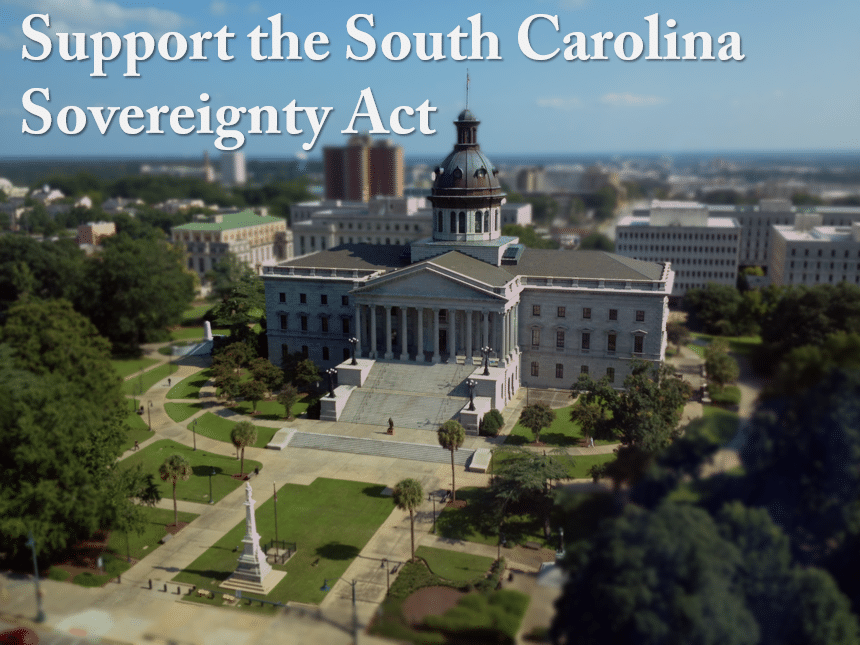
Members of the South Carolina General Assembly are seeking to enact a comprehensive nullification bill, a major step toward enforcing the U.S. Constitution and pushing back against federal overreach.
House Bill 3539 (H.3539), titled the “South Carolina Sovereignty Act,” is sponsored by Representative Josiah Magnuson (R-Campobello) and 22 other representatives. If enacted, this bill would create a robust and comprehensive process for nullifying unconstitutional federal laws and policies enacted after January 1, 2021.
Noting that “a long train of abuses and usurpations has been imposed by the federal government of the United States against the people of South Carolina,” H.3539 declares:
[I]t is the intent of the people and General Assembly of South Carolina to abide by the United States Constitution and to reject all laws and orders not made in pursuance thereof.
If enacted, the South Carolina Sovereignty Act would empower the state’s Legislative Council to review “any act, law, treaty, presidential executive order, regulation, rule, or regulatory order issued, adopted, or implemented by the government of the United States on or after January 1, 2021,” and require it to review orders if requested by the governor or at least 20 state legislators.
After reviewing the federal order, the Legislative Council may refer it to the state attorney general and governor for consideration. In reviewing the federal order, the attorney general would be required to “consider whether the federal order infringes upon:”
(a) any of the individual rights guaranteed by the Bill of Rights including, but not limited to, the establishment or free exercise of religion, freedom of speech, freedom of the press, the right to peaceably assemble, the right to petition for redress of grievances, the right to keep and bear arms, security from unreasonable searches and seizures, due process of law, a speedy public trial by an impartial jury, and freedom from excessive bail, or cruel and unusual punishments; and
(b) any powers reserved to the State under the Tenth Amendment to the United States Constitution including, but not limited to, mandates relating to a pandemic or other public health emergency, improper interference with the state’s election laws and procedures, improper interference with the state’s use and regulation of its natural resources, regulation of the agricultural industry, regulations of local land use and zoning policies, or the imposition of social policies or governance standards upon state or local governmental bodies or agencies, educational and nonprofit institutions, or industries regulated by the State or operating wholly within its borders.
If the attorney general declares the federal order constitutional, the General Assembly may pass a resolution overriding that determination. If the federal order is found to be unconstitutional, all state and local government entities would be banned from “employ[ing] state funds, personnel, or facilities to implement, attempt to implement, or assist in [its] implementation.”
The South Carolina Sovereignty Act is firmly grounded in the text of the U.S. Constitution. In particular, Article VI states, “[t]his Constitution, and the Laws of the United States which shall be made in Pursuance thereof … shall be the supreme Law of the Land.” Additionally, the 10th Amendment makes clear that all powers not granted by the Constitution to the federal government are reserved to the states and to the people.
Accordingly, any federal action that violates or contradicts the Constitution cannot be “made in Pursuance thereof” and, thus, is not “the supreme Law of the Land.” Unfortunately, in the last several decades, thousands of unconstitutional laws on the federal, state, and even local levels have been created and enforced.
The South Carolina Sovereignty Act follows and enforces both of these important constitutional provisions (Article VI and the 10th Amendment) by nullifying unconstitutional federal actions and by restoring state sovereignty. Additionally, exercising these powers is more important now than ever, considering the extent to which the federal government has overreached. If our leaders adhered consistently to the Constitution, 80% of the federal government would be declared unconstitutional, and the situation will likely get worse under the Biden administration.
Urge your state representative and senator to support the South Carolina Sovereignty Act (H.3539) and any other attempt to properly enforce the Constitution and nullify federal overreach.
Image source: Wikimedia/ HaloMasterMind
Although we provide a way to easily email legislators, we know from long experience that it takes a lot more interaction with your legislators to get your point across than that provided by emails alone.
That's why we provide an easy way not only to email them, but to contact them by phone, tweet, and even video message them.

